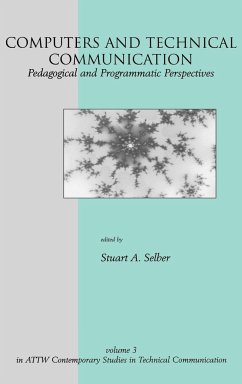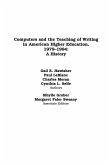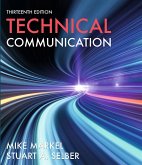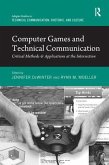- Gebundenes Buch
- Merkliste
- Auf die Merkliste
- Bewerten Bewerten
- Teilen
- Produkt teilen
- Produkterinnerung
- Produkterinnerung
The essays collected in this volume address the full range of pedagogical and programmatic issues specifically facing technical communication teachers and programme directors in the computer age. The authors locate computers and computing activities within the richly-textured cultural contexts of a technological society, focusing on the technical communication instructional issues that remain most important as old versions of hardware and software are endlessly replaced by new ones.
Andere Kunden interessierten sich auch für
![Technical Writing for Today and Tomorrow Technical Writing for Today and Tomorrow]() Stan Hunter KrancTechnical Writing for Today and Tomorrow100,99 €
Stan Hunter KrancTechnical Writing for Today and Tomorrow100,99 €![How To Write Technical Writing How To Write Technical Writing]() HowexpertHow To Write Technical Writing32,99 €
HowexpertHow To Write Technical Writing32,99 €![Technical Writing for Today and Tomorrow Technical Writing for Today and Tomorrow]() Stan Hunter KrancTechnical Writing for Today and Tomorrow84,99 €
Stan Hunter KrancTechnical Writing for Today and Tomorrow84,99 €![Computers and the Teaching of Writing in American Higher Education, 1979-1994 Computers and the Teaching of Writing in American Higher Education, 1979-1994]() Gail HawisherComputers and the Teaching of Writing in American Higher Education, 1979-1994102,99 €
Gail HawisherComputers and the Teaching of Writing in American Higher Education, 1979-1994102,99 €![Computers and the Teaching of Writing in American Higher Education, 1979-1994 Computers and the Teaching of Writing in American Higher Education, 1979-1994]() Gail HawisherComputers and the Teaching of Writing in American Higher Education, 1979-199451,99 €
Gail HawisherComputers and the Teaching of Writing in American Higher Education, 1979-199451,99 €![Technical Communication Technical Communication]() Mike MarkelTechnical Communication75,99 €
Mike MarkelTechnical Communication75,99 €![Computer Games and Technical Communication Computer Games and Technical Communication]() Jennifer DewinterComputer Games and Technical Communication217,99 €
Jennifer DewinterComputer Games and Technical Communication217,99 €-
-
-
The essays collected in this volume address the full range of pedagogical and programmatic issues specifically facing technical communication teachers and programme directors in the computer age. The authors locate computers and computing activities within the richly-textured cultural contexts of a technological society, focusing on the technical communication instructional issues that remain most important as old versions of hardware and software are endlessly replaced by new ones.
Hinweis: Dieser Artikel kann nur an eine deutsche Lieferadresse ausgeliefert werden.
Hinweis: Dieser Artikel kann nur an eine deutsche Lieferadresse ausgeliefert werden.
Produktdetails
- Produktdetails
- Verlag: Praeger
- Seitenzahl: 426
- Erscheinungstermin: 1. November 1997
- Englisch
- Abmessung: 240mm x 161mm x 27mm
- Gewicht: 801g
- ISBN-13: 9781567503319
- ISBN-10: 1567503314
- Artikelnr.: 25610361
- Herstellerkennzeichnung
- Libri GmbH
- Europaallee 1
- 36244 Bad Hersfeld
- gpsr@libri.de
- Verlag: Praeger
- Seitenzahl: 426
- Erscheinungstermin: 1. November 1997
- Englisch
- Abmessung: 240mm x 161mm x 27mm
- Gewicht: 801g
- ISBN-13: 9781567503319
- ISBN-10: 1567503314
- Artikelnr.: 25610361
- Herstellerkennzeichnung
- Libri GmbH
- Europaallee 1
- 36244 Bad Hersfeld
- gpsr@libri.de
Stuart A. Selber
Foreword, Art Young. Introduction, Stuart A. Selber PART I: BROADENING
NOTIONS OF COMPUTER LITERACY Hypertext Spheres of Influence in Technical
Communication Instructional Contexts, Stuart A. Selber Legal Realities and
Ethical Hyperrealities: A Critical Approach Toward Cyberwriting, James E.
Porter Visual Literacy in the Computer Age: A Complex Perceptual Landscape,
Lee Brasseur Wild Technologies: Computer Use and Social Possibility,
Johndan Johnson-Eilola Teaching and Learning Communities: Locating
Literacy, Agency, and Authority in a Digital Domain, Billie J. Wahlstrom
PART II: EXPLORING PEDAGOGICAL FRAMEWORKS FOR COMPUTERS AND TECHNICAL
COMMUNICATION Distance Learning Via the World Wide Web: Information,
Engagement, and Community, Ann Hill Duin and Ray Archee Shaping
Technologies: The Complexity of Electronic Collaborative Interaction,
Rebecca E. Burnett and David Clark Learning Up Close and at a Distance,
Nancy Allen and Gregory A. Wickliff Technologies and Tensions: Designing
Online Environments for Teaching Technical Communication, Brad Mehlenbacher
PART III: EXAMINING COMPUTER-SUPPORTED COMMUNICATION FACILITIES FROM
PEDAGOGICAL PERSPECTIVES Forces of Conservatism and Change in
Computer-Supported Communication Facilities: Programmatic and Institutional
Responses to Change, Richard J. Selfe and Cynthia L. Selfe
Computer-Supported Classrooms and Curricular Change in Technical
Communication Programs, James Kalmbach Building Relationships to Garner
Technological Resources and Support in Technical Communication Programs,
Bill Karis Designing Computer Classrooms for Technical Communication
Programs, Tharon Howard PART IV: PLANNING FOR TECHNOLOGICAL CHANGES IN
TECHNICAL COMMUNICATION PROGRAMS Guiding Technical Communication Programs
Through Rapid Change: The Cycle Between Technological and Curricular
Change, Mark Werner and David S. Kaufer Supporting Faculty Development in
Computers and Technical Communication, Stephen A. Bernhardt and Carolyn S.
Vickrey New Roles for Technical Communicators in the Computer Age,
Henrietta Nickels Shirk Collaborative Conflict and the Future:
Academic-Industrial Alliances and Adaptations, Pamela S. Ecker and
Katherine Staples Author Index Subject Index About the Contributors
NOTIONS OF COMPUTER LITERACY Hypertext Spheres of Influence in Technical
Communication Instructional Contexts, Stuart A. Selber Legal Realities and
Ethical Hyperrealities: A Critical Approach Toward Cyberwriting, James E.
Porter Visual Literacy in the Computer Age: A Complex Perceptual Landscape,
Lee Brasseur Wild Technologies: Computer Use and Social Possibility,
Johndan Johnson-Eilola Teaching and Learning Communities: Locating
Literacy, Agency, and Authority in a Digital Domain, Billie J. Wahlstrom
PART II: EXPLORING PEDAGOGICAL FRAMEWORKS FOR COMPUTERS AND TECHNICAL
COMMUNICATION Distance Learning Via the World Wide Web: Information,
Engagement, and Community, Ann Hill Duin and Ray Archee Shaping
Technologies: The Complexity of Electronic Collaborative Interaction,
Rebecca E. Burnett and David Clark Learning Up Close and at a Distance,
Nancy Allen and Gregory A. Wickliff Technologies and Tensions: Designing
Online Environments for Teaching Technical Communication, Brad Mehlenbacher
PART III: EXAMINING COMPUTER-SUPPORTED COMMUNICATION FACILITIES FROM
PEDAGOGICAL PERSPECTIVES Forces of Conservatism and Change in
Computer-Supported Communication Facilities: Programmatic and Institutional
Responses to Change, Richard J. Selfe and Cynthia L. Selfe
Computer-Supported Classrooms and Curricular Change in Technical
Communication Programs, James Kalmbach Building Relationships to Garner
Technological Resources and Support in Technical Communication Programs,
Bill Karis Designing Computer Classrooms for Technical Communication
Programs, Tharon Howard PART IV: PLANNING FOR TECHNOLOGICAL CHANGES IN
TECHNICAL COMMUNICATION PROGRAMS Guiding Technical Communication Programs
Through Rapid Change: The Cycle Between Technological and Curricular
Change, Mark Werner and David S. Kaufer Supporting Faculty Development in
Computers and Technical Communication, Stephen A. Bernhardt and Carolyn S.
Vickrey New Roles for Technical Communicators in the Computer Age,
Henrietta Nickels Shirk Collaborative Conflict and the Future:
Academic-Industrial Alliances and Adaptations, Pamela S. Ecker and
Katherine Staples Author Index Subject Index About the Contributors
Foreword, Art Young. Introduction, Stuart A. Selber PART I: BROADENING
NOTIONS OF COMPUTER LITERACY Hypertext Spheres of Influence in Technical
Communication Instructional Contexts, Stuart A. Selber Legal Realities and
Ethical Hyperrealities: A Critical Approach Toward Cyberwriting, James E.
Porter Visual Literacy in the Computer Age: A Complex Perceptual Landscape,
Lee Brasseur Wild Technologies: Computer Use and Social Possibility,
Johndan Johnson-Eilola Teaching and Learning Communities: Locating
Literacy, Agency, and Authority in a Digital Domain, Billie J. Wahlstrom
PART II: EXPLORING PEDAGOGICAL FRAMEWORKS FOR COMPUTERS AND TECHNICAL
COMMUNICATION Distance Learning Via the World Wide Web: Information,
Engagement, and Community, Ann Hill Duin and Ray Archee Shaping
Technologies: The Complexity of Electronic Collaborative Interaction,
Rebecca E. Burnett and David Clark Learning Up Close and at a Distance,
Nancy Allen and Gregory A. Wickliff Technologies and Tensions: Designing
Online Environments for Teaching Technical Communication, Brad Mehlenbacher
PART III: EXAMINING COMPUTER-SUPPORTED COMMUNICATION FACILITIES FROM
PEDAGOGICAL PERSPECTIVES Forces of Conservatism and Change in
Computer-Supported Communication Facilities: Programmatic and Institutional
Responses to Change, Richard J. Selfe and Cynthia L. Selfe
Computer-Supported Classrooms and Curricular Change in Technical
Communication Programs, James Kalmbach Building Relationships to Garner
Technological Resources and Support in Technical Communication Programs,
Bill Karis Designing Computer Classrooms for Technical Communication
Programs, Tharon Howard PART IV: PLANNING FOR TECHNOLOGICAL CHANGES IN
TECHNICAL COMMUNICATION PROGRAMS Guiding Technical Communication Programs
Through Rapid Change: The Cycle Between Technological and Curricular
Change, Mark Werner and David S. Kaufer Supporting Faculty Development in
Computers and Technical Communication, Stephen A. Bernhardt and Carolyn S.
Vickrey New Roles for Technical Communicators in the Computer Age,
Henrietta Nickels Shirk Collaborative Conflict and the Future:
Academic-Industrial Alliances and Adaptations, Pamela S. Ecker and
Katherine Staples Author Index Subject Index About the Contributors
NOTIONS OF COMPUTER LITERACY Hypertext Spheres of Influence in Technical
Communication Instructional Contexts, Stuart A. Selber Legal Realities and
Ethical Hyperrealities: A Critical Approach Toward Cyberwriting, James E.
Porter Visual Literacy in the Computer Age: A Complex Perceptual Landscape,
Lee Brasseur Wild Technologies: Computer Use and Social Possibility,
Johndan Johnson-Eilola Teaching and Learning Communities: Locating
Literacy, Agency, and Authority in a Digital Domain, Billie J. Wahlstrom
PART II: EXPLORING PEDAGOGICAL FRAMEWORKS FOR COMPUTERS AND TECHNICAL
COMMUNICATION Distance Learning Via the World Wide Web: Information,
Engagement, and Community, Ann Hill Duin and Ray Archee Shaping
Technologies: The Complexity of Electronic Collaborative Interaction,
Rebecca E. Burnett and David Clark Learning Up Close and at a Distance,
Nancy Allen and Gregory A. Wickliff Technologies and Tensions: Designing
Online Environments for Teaching Technical Communication, Brad Mehlenbacher
PART III: EXAMINING COMPUTER-SUPPORTED COMMUNICATION FACILITIES FROM
PEDAGOGICAL PERSPECTIVES Forces of Conservatism and Change in
Computer-Supported Communication Facilities: Programmatic and Institutional
Responses to Change, Richard J. Selfe and Cynthia L. Selfe
Computer-Supported Classrooms and Curricular Change in Technical
Communication Programs, James Kalmbach Building Relationships to Garner
Technological Resources and Support in Technical Communication Programs,
Bill Karis Designing Computer Classrooms for Technical Communication
Programs, Tharon Howard PART IV: PLANNING FOR TECHNOLOGICAL CHANGES IN
TECHNICAL COMMUNICATION PROGRAMS Guiding Technical Communication Programs
Through Rapid Change: The Cycle Between Technological and Curricular
Change, Mark Werner and David S. Kaufer Supporting Faculty Development in
Computers and Technical Communication, Stephen A. Bernhardt and Carolyn S.
Vickrey New Roles for Technical Communicators in the Computer Age,
Henrietta Nickels Shirk Collaborative Conflict and the Future:
Academic-Industrial Alliances and Adaptations, Pamela S. Ecker and
Katherine Staples Author Index Subject Index About the Contributors








